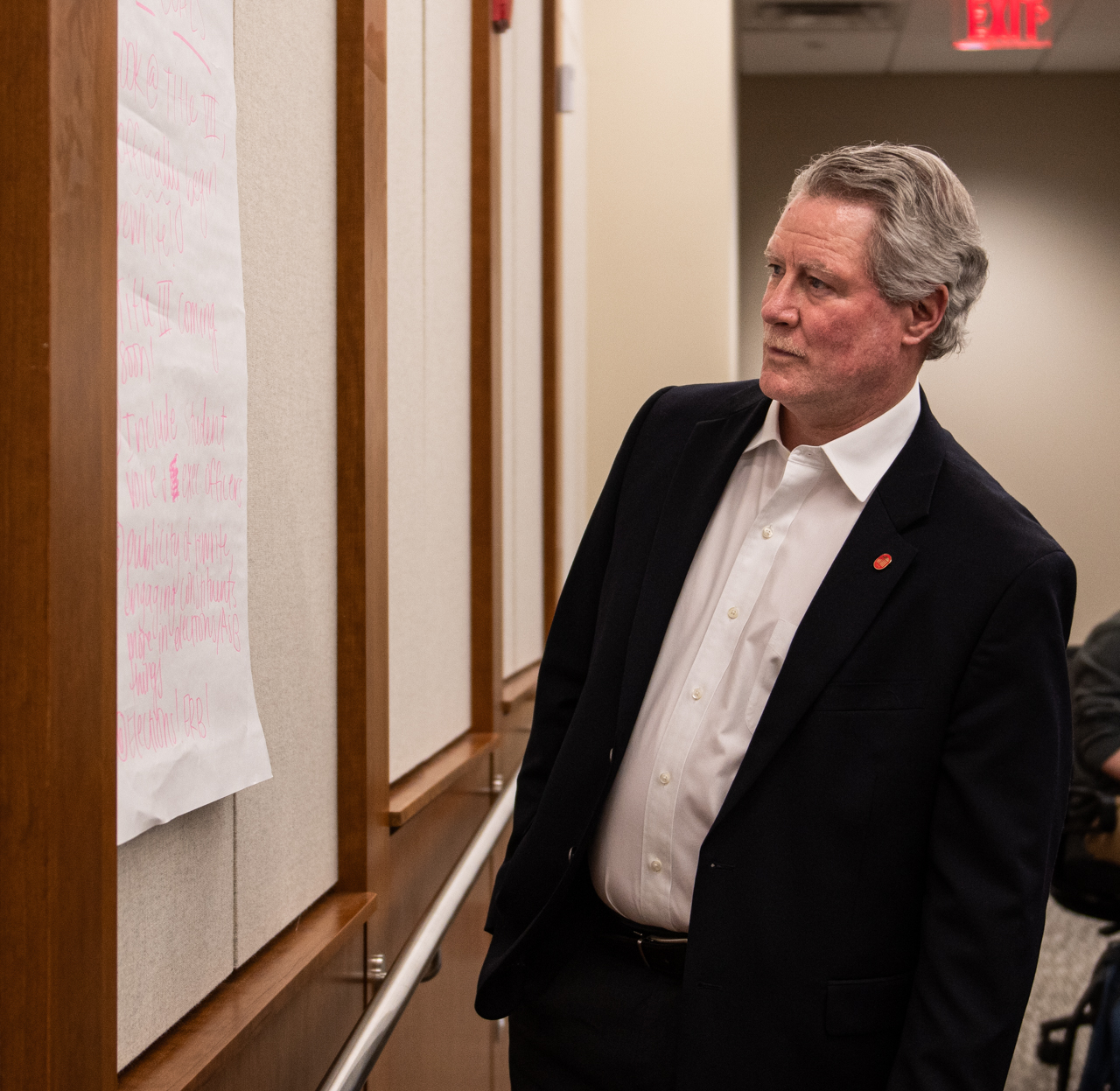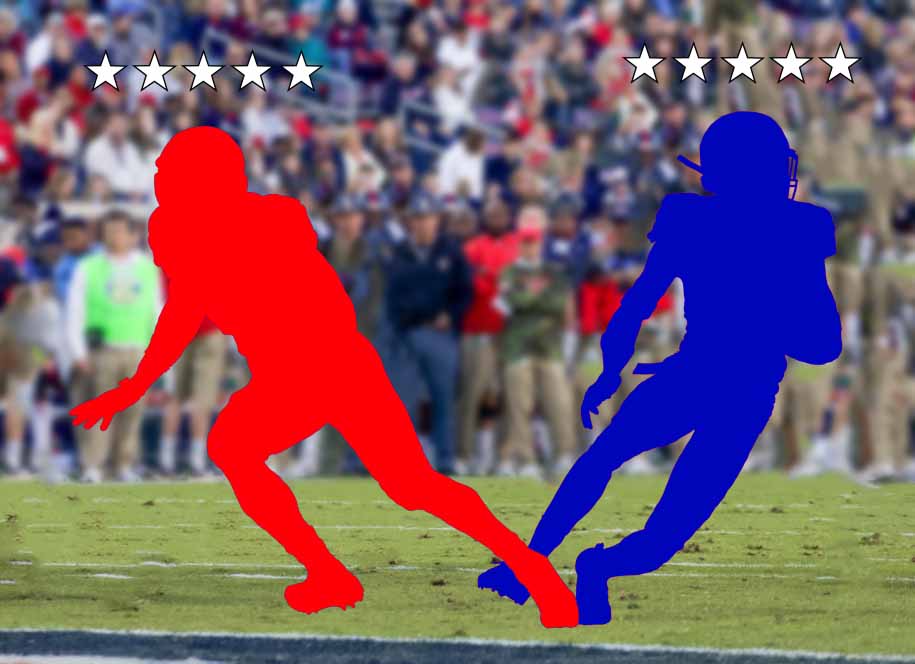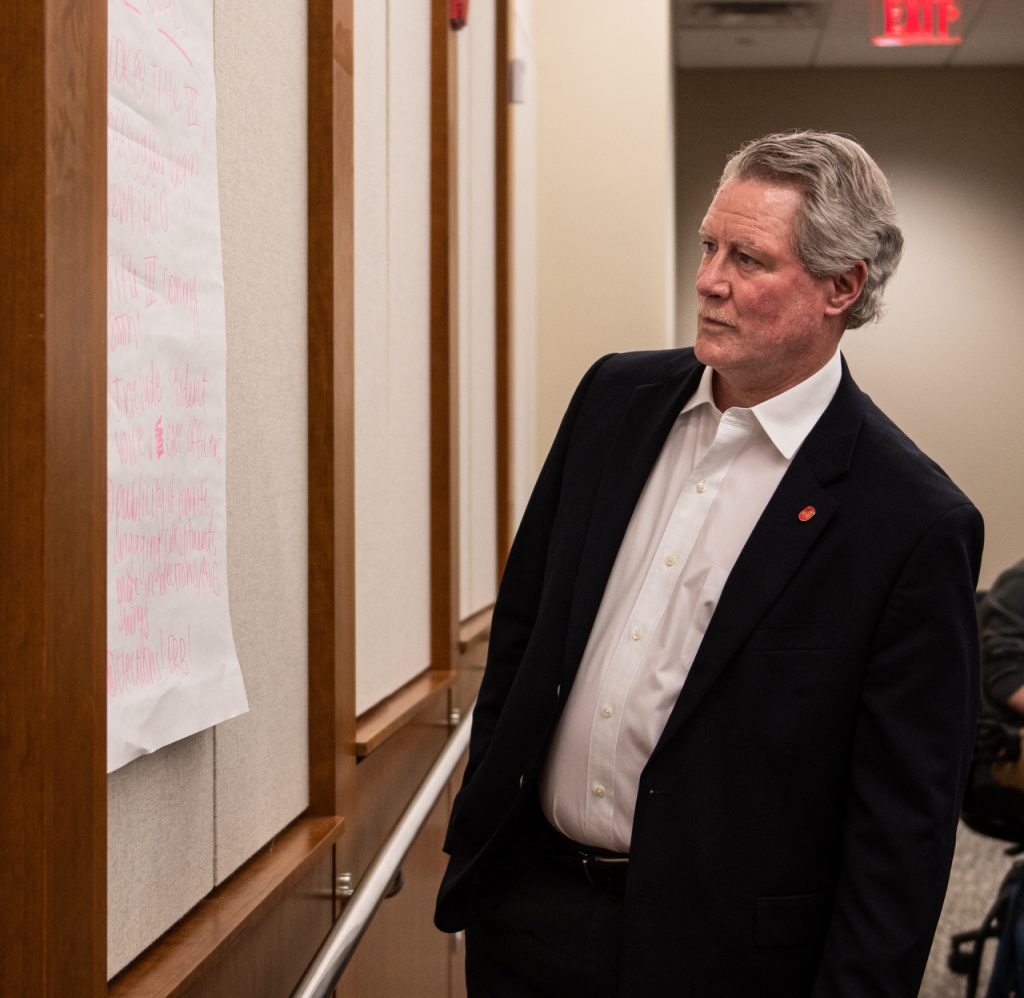
The Associated Student Body (ASB) Senate hosted Chancellor Glenn Boyce at its meeting on Tuesday to ask him questions about his plans for the university. Boyce, who said he wanted students to be at the center of university decisions, revealed some of his plans for the first time after months of protests about a lack of transparency from the new chancellor.
ASB Vice President Charlotte Shackelford requested that all senators ask their questions respectfully and said that she hoped this would be a positive way for the senate to communicate with Boyce.
Senators’ questions ranged from improvements to the University Counseling Center (UCC) to how the chancellor plans to recruit prospective students. Often, Boyce answered questions by saying that students should help him come up with plans to better the university.
Corbin Fox, chairman of the Committee on Student Life, asked Boyce about recent student concerns about the UCC and asked if his administration was aware of these issues.
Boyce said he met with the UCC recently and was discouraged when he learned that sometimes a student must wait months to see a counselor. He said that the only way to fix the issue was to find more counselors.
“It’s necessary, and it’s a need,” Boyce said. “We’ve got to get up off it and get with it, and we will. We’ve just given them a whole new wing, and it needs to be constructed properly, put together. More than that, we need the counselors.”

Thomas Ward, legislative aide for the Committee on Inclusion and Cross Cultural Engagement, asked if Boyce was more concerned about the desires of the student body or the IHL in regard to the IHL’s authority over whether the Confederate monument is moved to the Confederate cemetery.
Boyce said that he was concerned with the overall direction of the university, and that if students, faculty, alumni and himself could agree on a position, he would support it.
“My relationship with (the IHL) is a relationship of, they’re my bosses,” Boyce said. “They have the authority. We have to have their support … They’re constitutionally established years ago, so we have to work with them. It’s very clear — if you’ve been following it — where I stand and where some of them stand. I don’t mind telling you that I’m working as fast as I can to get that resubmitted.”
Boyce went on to say that crafting a proposal to move the Confederate monument to the cemetery is “way more complicated” than people realize.
“While we know that there’s a certain amount of graves there, we know the order of some of them. It literally gets down to, ladies and gentlemen, (that) we don’t know where they all are,” Boyce said. “We need to do some laser ground penetration and things of that nature.”
Erin Bowens, a member of the Committee on Inclusion and Cross Cultural Engagement, asked the chancellor what his plans were to make the campus more inclusive for marginalized communities.
Boyce responded, “Let me ask you this: do you think it’s not inclusive at this point?” Bowens said that she thought the university was moving in the right direction, but students should have access to more resources. Boyce then said that he depends on students to come to him with issues about inclusivity.
“Some of the big ideas that have already been brought forth have been amazing,” Boyce said.
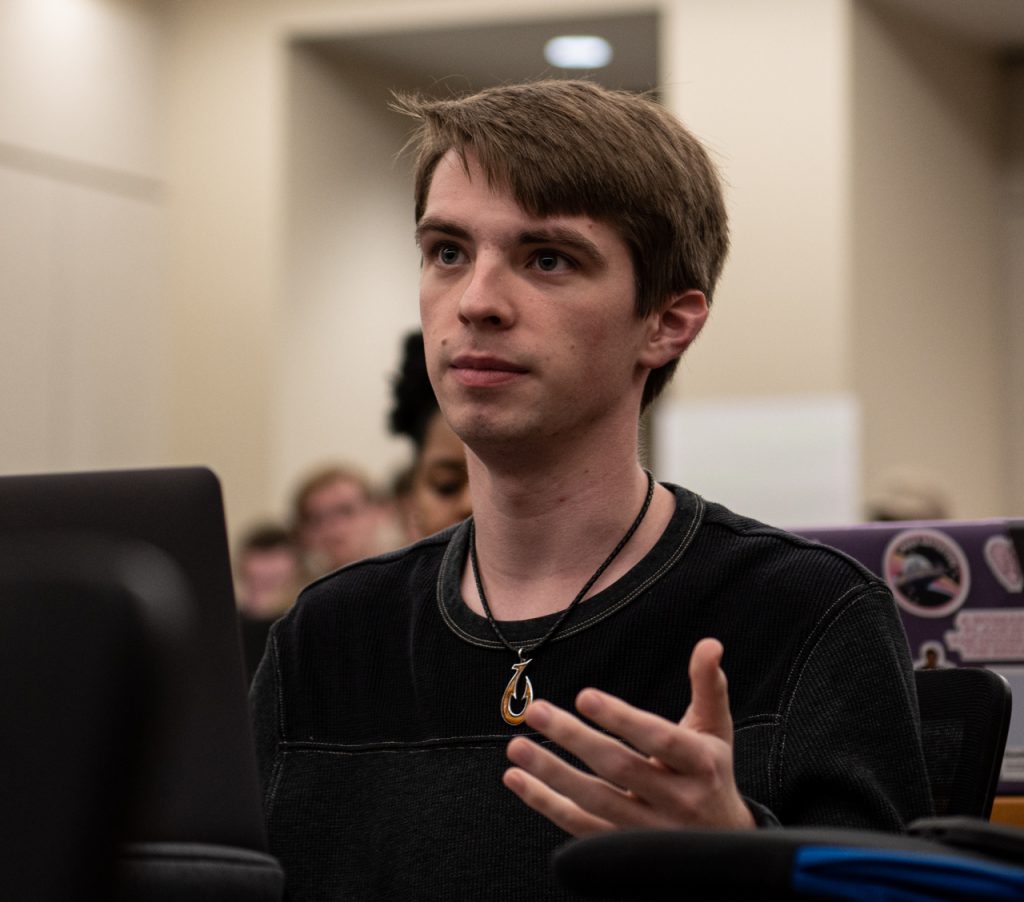
Boyce said the university has plans to “tear down” its website and rebuild it from the ground up. He estimated the project would cost $1.5 million to rebuild an estimated 20,000 pages.
“Our website is eight years old, and it’s antique,” Boyce said. “One of the major problems with that website is that it’s not mobile friendly, and that’s a huge problem. When a parent wants to go to pay their bill from their phone and they can’t get into the website and pay it to the bursar and so forth, that’s a serious problem.”
Noah Hubbard, an accountancy major, asked Boyce what role the university’s website would play in recruiting new students. He used Clemson University’s website as an example, which allows prospective students to type in keywords regarding degree programs of interest and provides them with a list of similar programs.
Many of the senators’ questions focused on recruiting prospective students. DeArrius Rhymes, a member of the Committee on Inclusion and Cross Cultural Engagement, asked Boyce if he would visit high schools in rural areas of Mississippi after he mentioned recent recruiting at Oxford High School.
“I’ll go to those schools, and, by the way, I’ve been to those schools,” Boyce said. “When I was president of Holmes Community College, I went all through the Delta … I can’t lay it out, but I’ve got some thoughts and a plan for how we’re going to recruit in underrepresented areas better,” Boyce said.
For Rhymes, who is from Hazlehurst, the question was about more than recruitment. He was speaking from personal experience.
“My sister went to school here in 2006 and graduated in 2010,” Rhymes said. “I came here in 2017, and I can’t recount one person (from Hazlehurst) who came to the University of Mississippi between the span of me and her — simply because of the representation of it or the ideas that were portrayed only 30 minutes south of Jackson.”
Abby Johnston, an ASB senator from the School of Education, said she attended one of the Institutions of Higher Learning (IHL) Board’s listening sessions during the chancellor search process.
“I was looking for a chancellor who was going to promote some of the positive things on campus,” Johnston said. “I think it’s really hard to be a student here who’s involved with the Lott Institute or METP (Mississippi Excellence in Teaching Program) or the Honors College that are really awesome on campus, but pick up the paper and read really negative press.”
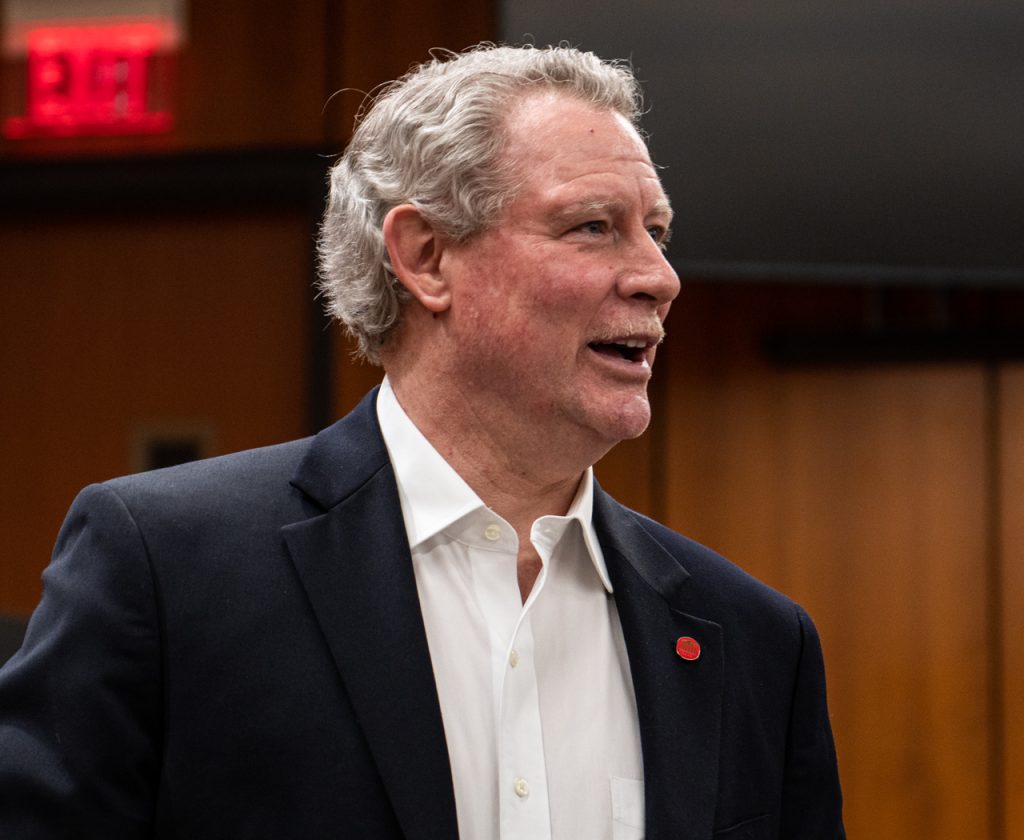
She asked Boyce what his relationship was with the media and if he had the same concerns that she did.
“As far as the press goes, I couldn’t agree with you more,” Boyce said.
Boyce said that he has conversations with his communications team about how to get a “narrative of achievement” to gain traction. He plans to release a newsletter at the end of this week called “At the Flagship,” which will include “exciting things” and promote “what we’ve achieved,” such as Arielle Hudson receiving the Rhodes Scholarship.
When Robert Hughes, ASB legislative aide for the Committee on Athletics, asked Boyce about how he planned to combat falling admissions numbers, Boyce said he planned to increase the amount of mail sent to potential students.
He also expressed a plan to create a more targeted plan for recruitment that would use data gathered on prospective students based on their known individual hobbies and interests.
“I don’t know where this is going or how it’s going to work right now, but it’s interesting,” Boyce said. “They have identified a point where you can almost send information into homes now because of technology and data that basically says, ‘I know what that student’s interest is inside that home.’ We can almost target students with your interests. We don’t even know you, and we can can say, ‘Over here they’re going to be really interested in leadership.’”
Shackelford said that the senators could understand the importance of the ASB Senate from this conversation with the chancellor.
“So many times, Chancellor Boyce emphasized, ‘I need you to come up with a plan,’” Shackelford said. “He is one person that can’t do absolutely everything. He can’t just pull a magical string.”


